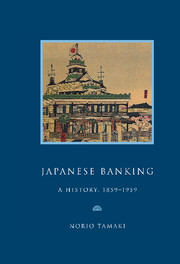Book contents
- Frontmatter
- Contents
- Preface
- Genealogy of leading Japanese banks, 1859–1959
- List of abbreviations
- Map
- Part I A bankrupt Shogunate, 1859–1868
- Part II The Meiji Restoration: monetary confusion and banking experiments, 1868–1881
- Part III Matsukata, the wizard of Japanese banking, 1881–1897; the Yokohama Specie Bank (1880) and the Bank of Japan (1882)
- Part IV The Japanese on the London money market, 1897–1911
- Historical background
- 13 The ‘Siamese twins’: Nichigin and Shokin, 1897–1911
- 14 Special banking, 1897–1911
- 15 Banking at the end of the Meiji era, 1900–1911
- 16 Banking and the securities market, 1897–1911
- Part V War, the Japanese boom years, 1911–1919
- Part VI Crisis and the road to war, 1919–1937
- Part VII Complete commitment, struggle and defeat, 1937–1945
- Part VIII American ‘democratisation’ and the search for growth, 1945–1959
- An extraordinary century, 1859–1959
- Appendices
- Notes
- Bibliography
- Index
Historical background
Published online by Cambridge University Press: 03 February 2010
- Frontmatter
- Contents
- Preface
- Genealogy of leading Japanese banks, 1859–1959
- List of abbreviations
- Map
- Part I A bankrupt Shogunate, 1859–1868
- Part II The Meiji Restoration: monetary confusion and banking experiments, 1868–1881
- Part III Matsukata, the wizard of Japanese banking, 1881–1897; the Yokohama Specie Bank (1880) and the Bank of Japan (1882)
- Part IV The Japanese on the London money market, 1897–1911
- Historical background
- 13 The ‘Siamese twins’: Nichigin and Shokin, 1897–1911
- 14 Special banking, 1897–1911
- 15 Banking at the end of the Meiji era, 1900–1911
- 16 Banking and the securities market, 1897–1911
- Part V War, the Japanese boom years, 1911–1919
- Part VI Crisis and the road to war, 1919–1937
- Part VII Complete commitment, struggle and defeat, 1937–1945
- Part VIII American ‘democratisation’ and the search for growth, 1945–1959
- An extraordinary century, 1859–1959
- Appendices
- Notes
- Bibliography
- Index
Summary
The Japanese government remained dominated by the old Satsuma–Choshu clique, but change loomed over the political horizon. For the first time, the premiership was assumed in 1898 by Okuma, a former Saga man and an outsider. The Meiji oligarchs were ageing, and it was inevitable that the party system would take over the role thereto played by the senior statesmen. Thus the first decade of the twentieth century witnessed the emergence of political parties formed by both sides, by the oligarchs and by their opponents. Even the tiny socialist party gained followers as the labour movement emerged. The Peace Police Law of 1900 was intended to keep a sharp eye on anyone who demonstrated left-wing views. That year it was agreed, under a hawkish Choshu premiership, that the ministers of both the army and the navy would be a general and an admiral on active service. This concession was ultimately to prove disastrous. Extraterritoriality was abolished by 1899. The Anglo-Japanese Alliance, a triumph for Japan, was concluded in 1902. As a result Japan could confront Russia over Manchuria, which resulted in the Russo-Japanese War of 1904–5. Amidst wild euphoria Japan claimed a spectacular victory over Russia, but militarily and financially it was a close finish. Banking leadership had been handed over on his retirement by Matsukata in 1900 to a younger generation. Japanese bankers thereafter tended to rely heavily on the British banking system.
- Type
- Chapter
- Information
- Japanese BankingA History, 1859–1959, pp. 89Publisher: Cambridge University PressPrint publication year: 1995



